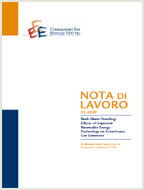Paths to Stability in Two-sided Matching with Uncertainty

Data
03.01.2013
03.01.2013
Autori
Emiliya Lazarova, Dinko Dimitrov
Codice JEL
C62, C78, D71, D83
C62, C78, D71, D83
Parole chiave:
Consistent Outcomes, One-to-One Uncertainty, Many-to-One Uncertainty, Paths to Stability, Two-Sided Matching
Consistent Outcomes, One-to-One Uncertainty, Many-to-One Uncertainty, Paths to Stability, Two-Sided Matching
Publisher
Climate Change and Sustainable Development
Climate Change and Sustainable Development
Editor
Carlo Carraro
Carlo Carraro
We consider one-to-one matching problems under two modalities of uncertainty that differ in the way types are assigned to agents. Individuals have preferences over the possible types of the agents from the opposite market side and initially know the “name” but not the ”type” of the other players. Learning occurs via matching and using Bayes’ rule. We introduce the notion of a stable and consistent outcome, and show how the interaction between blocking and learning behavior shapes the existence of paths to stability in each of the uncertainty environments. Existence of stable and consistent outcomes then follows as a side result.
